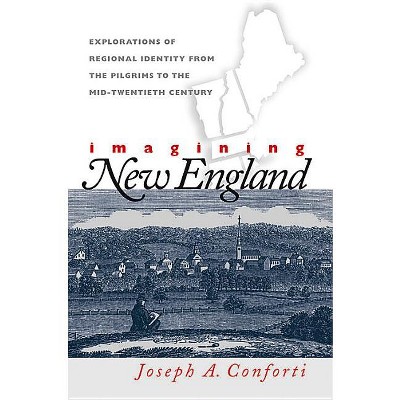Sponsored

Emerson's Emergence - (Self and Society in the Transformation of New England, 1800-) by Mary Kupiec Cayton (Paperback)
$55.00
In Stock
Eligible for registries and wish lists
Sponsored
About this item
Highlights
- As the culture of commercial capitalism came to dominate nineteenth-century New England, it changed people's ideas about how the world functioned, the nature of their work, their relationships to one another, and even the way they conceived of themselves as separate individuals.
- About the Author: Mary Kupiec Cayton teaches in the Program of American Studies and is associate director of the University Honors Program at Miami University.
- 322 Pages
- Literary Criticism, American
- Series Name: Self and Society in the Transformation of New England, 1800-
Description
About the Book
Emerson's Emergence: Self and Society in the Transformation of New England, 1800-1845Book Synopsis
As the culture of commercial capitalism came to dominate nineteenth-century New England, it changed people's ideas about how the world functioned, the nature of their work, their relationships to one another, and even the way they conceived of themselves as separate individuals. Drawing on the work of the last twenty years in New England social history, Mary Cayton argues that Ralph Waldo Emerson's work and career, when seen in the context of the momentous changes in the culture and economics of the region, reveal many of the tensions and contradictions inherent in the new capitalist social order. In exploring the genesis of liberal humanism as a calling in the United States, this case study implicitly poses questions about its assumptions, its aspirations, and its failings.Cayton traces the ways in which the social circumstances of Emerson's Boston gave rise to his philosophy of natural organicism, his search for an appropriate definition of the intellectual's role within society, and his exhortations to individuals to distrust the norms and practices of the mass culture that was emerging. She addresses the historical context of Emerson's emergence as a writer and orator and undertakes to describe the Federalism and Unitarianism in which Emerson grew up, explaining why he eventually rejected them in favor of romantic transcendentalism.
Cayton demonstrates how Emerson's thought was affected by the social pressures and ideological constructs that launched the new cultural discourse of individualism. A work of intellectual history and American studies, this book explores through Emerson's example the ways in which intellectuals both make their cultures and are made by them.
Review Quotes
This is an outstanding contribution to both literary and intellectual history.
Daniel Walker Howe, University of California, Los Angeles
"This is an outstanding contribution to both literary and intellectual history.
Daniel Walker Howe, University of California, Los Angeles"
About the Author
Mary Kupiec Cayton teaches in the Program of American Studies and is associate director of the University Honors Program at Miami University.Dimensions (Overall): 8.5 Inches (H) x 5.54 Inches (W) x .82 Inches (D)
Weight: 1.0 Pounds
Suggested Age: 22 Years and Up
Number of Pages: 322
Genre: Literary Criticism
Sub-Genre: American
Series Title: Self and Society in the Transformation of New England, 1800-
Publisher: University of North Carolina Press
Theme: General
Format: Paperback
Author: Mary Kupiec Cayton
Language: English
Street Date: August 24, 1992
TCIN: 1005873598
UPC: 9780807843925
Item Number (DPCI): 247-14-1693
Origin: Made in the USA or Imported
If the item details aren’t accurate or complete, we want to know about it.
Shipping details
Estimated ship dimensions: 0.82 inches length x 5.54 inches width x 8.5 inches height
Estimated ship weight: 1 pounds
We regret that this item cannot be shipped to PO Boxes.
This item cannot be shipped to the following locations: American Samoa (see also separate entry under AS), Guam (see also separate entry under GU), Northern Mariana Islands, Puerto Rico (see also separate entry under PR), United States Minor Outlying Islands, Virgin Islands, U.S., APO/FPO
Return details
This item can be returned to any Target store or Target.com.
This item must be returned within 90 days of the date it was purchased in store, shipped, delivered by a Shipt shopper, or made ready for pickup.
See the return policy for complete information.






